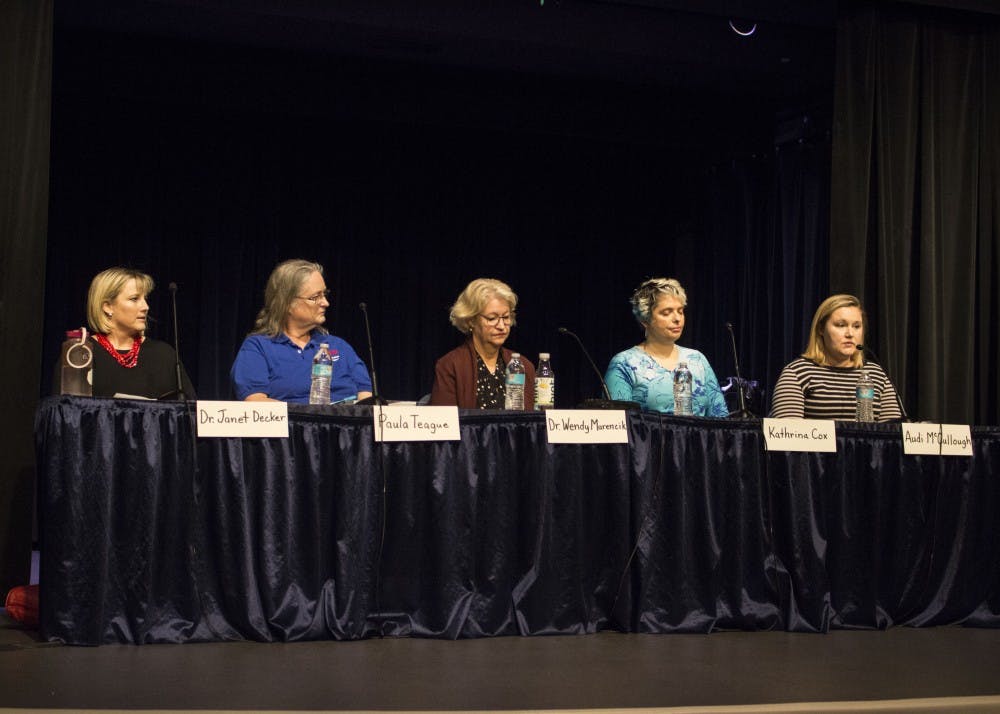Community members discussed whether the voucher system will affect the future of children with special needs Thursday evening as U.S. Secretary of Education Betsy DeVos continues her reign.
The event, a forum held at the Monroe County Public Library, was presented by the Indiana Coalition for Public Education. The forum gave a platform to student advocates and was moderated by Debbie Fish, a general and special educator of 34 years.
The audience was encouraged to write down potential questions and pass them up to be answered by the panel throughout the event.
Though each panelist came from a different perspective, the event as a whole spun around the idea of how special education is being changed in the current political climate by the implementation of voucher systems.
“We know that the people in charge are not educators,” chair of ICPE Cathy Fuentes-Rohwer said of the educational policymakers in Washington, D.C.. “The narrative is the money will follow the child as they choose charter schools or voucher schools or to stay at home or go online, but the fact is that their federal rights may not follow them.”
Audi McCullough, the mother of a son with a disability, spoke about her son’s experience in private school.
“I do remember them saying they couldn’t provide everything for every child with disabilities,” she said. “They didn’t have a nurse there which, for us, was a really big problem.”
The conversation quickly shifted to that of school choice, a main pillar of DeVos’ plan for the future. School choice focuses on giving families vouchers from money that would otherwise go to funding public school systems, allowing them to use the money for alternative educational choices.
These choices usually include private or parochial education, but can also include other options like online education.
“That choice is a powerful one,” Kathrina Cox, a special education teacher in Monroe County said on school choice. “I think something to think about is do we know everything that we should? Do we know everything we’re gaining? Because everyone has an agenda.”
Wendy Marencik, a clinical faculty member in the IU School of Education, spoke on her experience in the field over the past few decades.
“When I came to IU back in the 70s, the federal laws for special education were just starting to be reviewed to protect children with special needs,” she said. “The unfortunate part, is in the last year I’m hearing new language. I’m hearing language such as rescinding. I’m hearing language as rejecting children from coming into certain schools.”
She also talked about the difficulties of attracting teachers to the special education field and keeping them there once they’ve started. She said that the job is challenging, and working on teams to support students can make teachers feel like they aren’t in control.
“We know that if teachers are trained in the field, their retention rate is much higher,” Marencik said. “We’ve really pushed for the full year of student teaching because we know that we need to keep them in the field.”
Paula Teague, a regional program specialist with IN*Source, an organization responsible for helping parents of children with disabilities support their children, pointed to some resources that may be helpful, including a handbook for parents of students with disabilities.
To round out the personal testimony of the evening, Janet Decker, assistant professor of education policy at Indiana University, spoke on policy in the DeVos era.
She explained that private schools are not required to follow all parts of IDEA, the Individuals with Disabilities Education Act, and how this can harm students who are moved from public to private school systems.
“When it comes to these voucher programs, parents often don’t understand that when they accept a voucher program they’re waiving all of those rights,” she said. “When I did research in 2016 about the different special education requirements, 40 percent of the voucher money recipients did not require any type of special education training.”
She did stress that parents who use vouchers to move to private school systems can always return to public schools and regain their IDEA rights.
None of the panelists said overtly positive things about DeVos, but Decker pointed out one key issue.
“The panel tonight has Betsy DeVos’ name in it,” she said. “Whether you like her or you don’t like her, she’s definitely bringing attention to the issue. People are talking.”
Her fellow panelists nodded in agreement.
“The next attack that we need to be ready for is going to likely be an attack on special education,” Fuentes-Rohwer said. “This will be a death by a thousand cuts.”
The final question from the audience was “If Betsy DeVos were here, what would you want to ask her?”
“I would like to know why she thinks money is more important than the education of my child,” McCullough replied.
The audience clapped.




